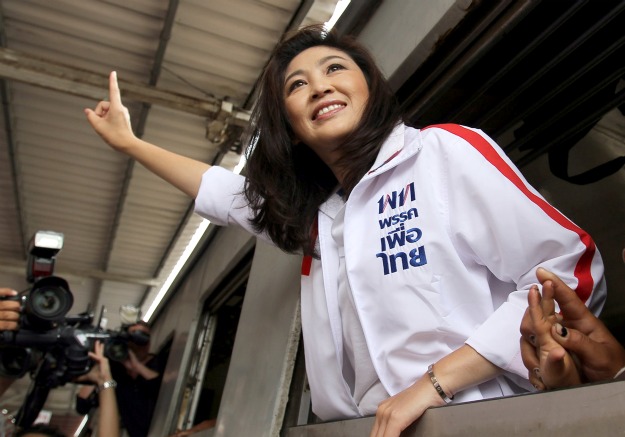On Sunday, Thailand will elect a new prime minister who belongs to a very familiar, and deeply divisive, family.

BANGKOK — The face of the woman likely to become Thailand’s first female prime minister has been staring out for weeks from thousands of political campaign posters here in the country’s capital. On one poster, the 44-year-old Yingluck Shinawatra is dressed in a sober black and white suit, dark locks cascading over her shoulders; in another, she greets a sea of supporters, hands pressed together in the traditional Thai gesture of greeting. The front-runner in Sunday, July 3’s national elections, Yingluck has campaigned masterfully.
Since being appointed candidate of the opposition Pheu Thai party in May, she has traveled across the country, donning a hijab in the Muslim south and electrifying audiences in the rural northeast. And she has also amply leveraged her family pedigree to vault herself from relative obscurity to ubiquitous fame. But if her last name helps her to win the vote, she’s likely to discover it will also deepen the tensions of her increasingly divided country.
Indeed, while Yingluck is a political newcomer, her family surely isn’t. She has not attempted to hide the fact that she has succeeded in large part because of her older brother, the fugitive billionaire and former prime minister Thaksin Shinawatra, who described her, from his exile in Dubai, as his “clone.” Thaksin was overthrown in a military coup in 2006 — allegedly for abusing his office and insulting Thailand’s revered king — but remains overwhelmingly popular in the rural hinterlands, where he is seen as a champion of the poor. Although he faces a two-year jail term for abuse of power, he and his supporters say the charge was politically motivated.
“If you love my brother,” Yingluck has asked her supporters in countless campaign stump speeches, “will you give his youngest sister a chance?” The 61-year-old still plays a central role in the Pheu Thai (For Thais) party, the latest incarnation of the Thaksin’s Thai Rak Thai party, which was outlawed after his overthrow. One party slogan — “Thaksin Thinks, Pheu Thai Acts” — is equally unambiguous about Thaksin’s importance to the campaign.
In Sunday’s election, Thaksin’s political machine comes up against the ruling Democrat Party of Oxford-educated Prime Minister Abhisit Vejjajiva. The Democrats haven’t won an election here for two decades, cobbling together a coalition in 2008 after another Thaksin-aligned party was dissolved by the courts. Forty other horses — mostly dark — make up the remainder of the field. They include former sex-industry kingpin and political clown Chuwit Kamolvisit, who is running for parliament as a self-styled graft buster, and Gen. Sonthi Boonyaratglin, the leader of the coup that deposed Thaksin, who is contesting seats in the Muslim south.
Ironically, the Democrats are being forced to fight the campaign on the populist terms pioneered by Thaksin, who won the hearts of Thailand’s rural underclass during his years in office by introducing a raft of new social welfare policies — and, his critics allege, buying votes with rice and cash. Both parties have unveiled a laundry list of ambitious election promises, from free Wi-Fi access and tablet computers, to wage hikes and subsidies for rice farmers.
Rather than being a contest between policies, the election is shaping up as a referendum on Thaksin and his bitterly divisive legacy. His enduring popularity while in power from 2001 to 2006 — the telecommunications mogul remains the only democratically elected Thai leader to serve a complete term in office — earned him the growing enmity of Thailand’s traditional elites. Many figures in the military and on the Privy Council, a powerful group of advisors to aging King Bhumibol, saw Thaksin’s populist appeal as a threat to the palace’s authority and their own positions at the center of Thai politics.
To his supporters, the Red Shirts, Thaksin is a hero of the poor who was toppled for challenging the guardians of Thailand’s traditional order. His detractors — spearheaded by another group of protesters wearing royal yellow — counter that his rule was marked by authoritarianism and corruption. The conflict came to a head last year, when swarms of Red Shirts descended on central Bangkok, calling for the resignation of Abhisit and fresh elections. At least 90 were killed and more than 2,000 injured in the subsequent crackdown by the Thai Army.
Thaksin, in choosing to have his sister run as a candidate, may have found the perfect way to return to the public spotlight after five years in self-exile. “Thaksin has picked the perfect choice,” said Pavin Chachavalpongpun, a fellow at Singapore’s Institute of Southeast Asian Studies (ISEAS). “The campaign of Yingluck has been successful so far both because of Thaksin’s political legacy and her own personal style.” Amid Thailand’s stable of political hacks and machine men, she indeed cuts a refreshing figure. Historian Chris Baker recently described Yingluck’s now-ubiquitous campaign portrait as “a brilliant bit of visual populism,” an elegant advertisement that “subtly restates the Shinawatra wealth and business success.”
Although she has never held public office, Yingluck grew up around politics. Born in 1967 as the youngest child of nine, her father Lert Shinawatra served as an MP for the northern city of Chiang Mai during the 1970s. After gaining degrees in politics from Chiang Mai University and Kentucky State University in the United States, Yingluck entered the corporate world, heading up AIS, the telecoms firm founded by Thaksin (and subsequently sold to Singapore’s Temasek Holdings). Most recently, she served as managing director of SC Asset Company, a family property firm.
In the hothouse atmosphere of Thai politics, Yingluck’s rapid rise has prompted concerns among many who fear she may be acting as a Trojan horse for her exiled brother’s return. Although she denies any plan to grant an amnesty to Thaksin or pursue the architects of the 2006 coup, plenty in Thailand are worried that an emboldened Thaksin would return to settle old scores. In an interview with the BBC this week, Abhisit warned that the return of the tycoon could lead to “instability.” There is also the prospect of a far-reaching probe into the bloody crackdown on last year’s Red Shirt protests, which could implicate senior members of the current government. (No one has so far been held responsible for any of the killings, and rights groups claim hundreds of protesters were arbitrarily detained).
For their part, Abhisit and his coalition partners have blamed Thaksin and his Red Shirt supporters for fomenting the violence, only raising the stakes further. “I think there is a lot of rhetoric about national reconciliation, but I am not totally convinced that the situation after the election will be reconciliatory,” said Rungrawee Chalermsripinyorat, Southeast Asia analyst with the International Crisis Group (ICG).
Although Yingluck is tracking for a clear majority — one recent poll gave Pheu Thai a 52 percent vs. 34 percent lead over the Democrats — it remains unclear whether she will be able to form a government. Of the two conceivable outcomes to Sunday’s vote, Rungrawee said, neither are likely to promote unity. If Pheu Thai wins an outright majority — at least 250 seats in Thailand’s 500-seat parliament — and forms a government, it could provoke a reaction from Thaksin’s enemies close to the military and the palace. In a country that has seen 18 attempted coups — 11 successful — since 1932, the prospect of another military intervention to shape the political landscape can never be discounted. “All options are possible,” said Pavin of ISEAS.
Rungrawee said any amnesty for Thaksin would likely trigger another round of street protests by the Yellow Shirts, who shut down Bangkok’s airports in late 2008 in calling for the resignation of Thaksinite Prime Minister Somchai Wongsawat.
The other outcome, a Democrat coalition government formed with the support of smaller parties, could provoke counterprotests from the Red Shirts. While such political horse-trading is legal, the Red Shirts could see a coalition deal as another attempt to “steal” votes from Pheu Thai after two of its predecessor parties were disbanded by the courts for alleged electoral irregularities. “Any interference from the traditional elites in the forming of the government would be a pretext for a new round of mass protests that could turn even more violent,” said Rungrawee of the ICG.
Yingluck’s main challenge — provided she wins — will be to negotiate the rocky political shoals of a tense and turbulent Thai society. Pavin said, “Thai society has never been more divisive. This election will split Thai opinions into two ways, one that supports the shift of the political status quo and another the maintaining of the old power.”
Is there a way out for Thailand? Barring some sort of accord between the pro- and anti-Thaksin factions, the streets of Bangkok are primed for a new round of mass protests. The main question is whether the opposing camps can avoid a fresh outbreak of violence like last year’s bloodbath. Unfortunately for Thai democracy, it’s a question that’s unlikely to be answered through the ballot box alone.
[Published by Foreign Policy, July 1, 2011]



